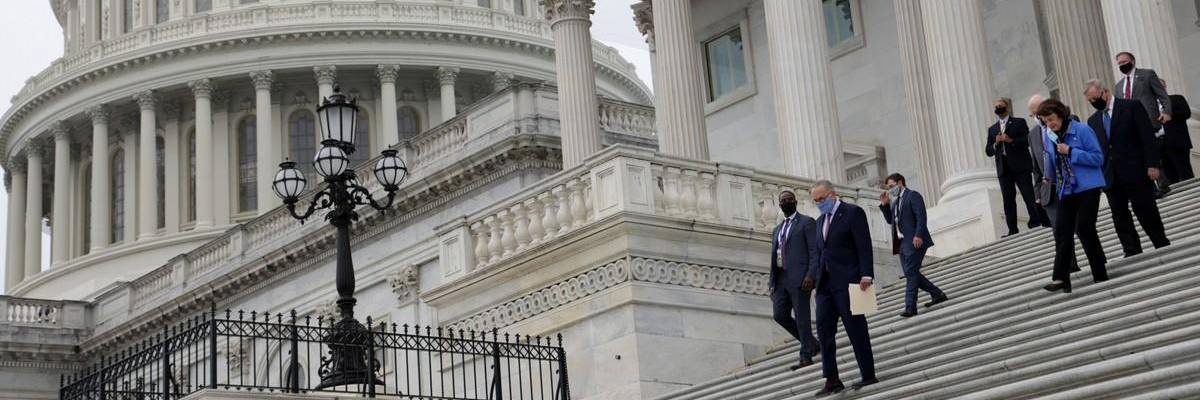

SUBSCRIBE TO OUR FREE NEWSLETTER
Daily news & progressive opinion—funded by the people, not the corporations—delivered straight to your inbox.
5
#000000
#FFFFFF
To donate by check, phone, or other method, see our More Ways to Give page.


Daily news & progressive opinion—funded by the people, not the corporations—delivered straight to your inbox.

Democratic lawmakers walk down the east front steps of the U.S. Capitol in Washington, D.C. on October 22, 2020. (Photo: Alex Wong/Getty Images)
U.S. lawmakers should "reject the notion that Congress must choose between antitrust and privacy reforms" when seeking to rein in Big Tech's anti-competitive behavior, a letter from 26 public interest organizations to Democratic legislators asserted Monday.
"Voters from both parties support breaking up monopolies and imposing stronger regulations on the largest tech companies."
"Recent remarks by Big Tech corporate leadership and its advocates have presented Congress with a false choice: fix corporate concentration or fix privacy. There is no reason that Congress should be so limited," the letter, which was led by the consumer advocacy group Public Citizen, states.
"Big Tech cannot, and should not, choose how it will be held accountable in a time when its damaging effects are becoming clearer by the day," the signers--who also include Demand Progress, Fight for the Future, RootsAction, and UltraViolet Action--continue. "Only elected officials, empowered by their constituents, should decide the policy solutions to the persistent problems in Americans' digital lives--not the corporations responsible for those problems."
The letter accuses tech companies of "attempting to deflect from the momentum behind legislation that will cut into their profit-making foundation of surveillance and anti-competitive gatekeeping," largely by highlighting "polling that shows favorable public attitudes towards laws protecting user privacy online as proof that Americans do not want antitrust reform."
"The truth is that people want true accountability, which requires action across the digital economy," the groups assert. "Public opinion polling consistently shows that the public knows Big Tech is bad for small business and has outsized influence on the government. Voters from both parties support breaking up monopolies and imposing stronger regulations on the largest tech companies."
"The need to hold Big Tech accountable for its harms goes beyond privacy and antitrust," the letter continues, citing a March letter from 60 health, safety, privacy, and education groups contending that the tech industry's business model is "fundamentally at odds with children's well-being."
Earlier this month, more than 100 groups including some of the new letter's signatories joined forces with smaller Silicon Valley tech companies in holding an Antitrust Day of Action to pressure members of Congress to pass two pieces of legislation aimed at reining in Big Tech's anti-competitive and anti-democratic practices.
Related Content

One of the bills, the Open App Markets Act, would empower application developers to reach customers without using online stores run by tech giants, ban major online sellers from requiring specific in-app payments, and establish privacy and security protections for consumers.
The other proposed legislation, the American Innovation and Choice Online Act, would block leading online platforms from favoring their own products and services, discriminating against businesses and harming competition, or requiring companies to buy their platform's goods or services for preferred placement.
Warning that "the window for reining in Big Tech's dominance may soon be closing," Demand Progress communications director Maria Langholz said on the Antitrust Day of Action that "Congress has a critical role to play in modernizing antitrust enforcement to rein in the power of modern-day monopolies like Amazon and Facebook/Meta."
Dear Common Dreams reader, The U.S. is on a fast track to authoritarianism like nothing I've ever seen. Meanwhile, corporate news outlets are utterly capitulating to Trump, twisting their coverage to avoid drawing his ire while lining up to stuff cash in his pockets. That's why I believe that Common Dreams is doing the best and most consequential reporting that we've ever done. Our small but mighty team is a progressive reporting powerhouse, covering the news every day that the corporate media never will. Our mission has always been simple: To inform. To inspire. And to ignite change for the common good. Now here's the key piece that I want all our readers to understand: None of this would be possible without your financial support. That's not just some fundraising cliche. It's the absolute and literal truth. We don't accept corporate advertising and never will. We don't have a paywall because we don't think people should be blocked from critical news based on their ability to pay. Everything we do is funded by the donations of readers like you. Will you donate now to help power the nonprofit, independent reporting of Common Dreams? Thank you for being a vital member of our community. Together, we can keep independent journalism alive when it’s needed most. - Craig Brown, Co-founder |
U.S. lawmakers should "reject the notion that Congress must choose between antitrust and privacy reforms" when seeking to rein in Big Tech's anti-competitive behavior, a letter from 26 public interest organizations to Democratic legislators asserted Monday.
"Voters from both parties support breaking up monopolies and imposing stronger regulations on the largest tech companies."
"Recent remarks by Big Tech corporate leadership and its advocates have presented Congress with a false choice: fix corporate concentration or fix privacy. There is no reason that Congress should be so limited," the letter, which was led by the consumer advocacy group Public Citizen, states.
"Big Tech cannot, and should not, choose how it will be held accountable in a time when its damaging effects are becoming clearer by the day," the signers--who also include Demand Progress, Fight for the Future, RootsAction, and UltraViolet Action--continue. "Only elected officials, empowered by their constituents, should decide the policy solutions to the persistent problems in Americans' digital lives--not the corporations responsible for those problems."
The letter accuses tech companies of "attempting to deflect from the momentum behind legislation that will cut into their profit-making foundation of surveillance and anti-competitive gatekeeping," largely by highlighting "polling that shows favorable public attitudes towards laws protecting user privacy online as proof that Americans do not want antitrust reform."
"The truth is that people want true accountability, which requires action across the digital economy," the groups assert. "Public opinion polling consistently shows that the public knows Big Tech is bad for small business and has outsized influence on the government. Voters from both parties support breaking up monopolies and imposing stronger regulations on the largest tech companies."
"The need to hold Big Tech accountable for its harms goes beyond privacy and antitrust," the letter continues, citing a March letter from 60 health, safety, privacy, and education groups contending that the tech industry's business model is "fundamentally at odds with children's well-being."
Earlier this month, more than 100 groups including some of the new letter's signatories joined forces with smaller Silicon Valley tech companies in holding an Antitrust Day of Action to pressure members of Congress to pass two pieces of legislation aimed at reining in Big Tech's anti-competitive and anti-democratic practices.
Related Content

One of the bills, the Open App Markets Act, would empower application developers to reach customers without using online stores run by tech giants, ban major online sellers from requiring specific in-app payments, and establish privacy and security protections for consumers.
The other proposed legislation, the American Innovation and Choice Online Act, would block leading online platforms from favoring their own products and services, discriminating against businesses and harming competition, or requiring companies to buy their platform's goods or services for preferred placement.
Warning that "the window for reining in Big Tech's dominance may soon be closing," Demand Progress communications director Maria Langholz said on the Antitrust Day of Action that "Congress has a critical role to play in modernizing antitrust enforcement to rein in the power of modern-day monopolies like Amazon and Facebook/Meta."
U.S. lawmakers should "reject the notion that Congress must choose between antitrust and privacy reforms" when seeking to rein in Big Tech's anti-competitive behavior, a letter from 26 public interest organizations to Democratic legislators asserted Monday.
"Voters from both parties support breaking up monopolies and imposing stronger regulations on the largest tech companies."
"Recent remarks by Big Tech corporate leadership and its advocates have presented Congress with a false choice: fix corporate concentration or fix privacy. There is no reason that Congress should be so limited," the letter, which was led by the consumer advocacy group Public Citizen, states.
"Big Tech cannot, and should not, choose how it will be held accountable in a time when its damaging effects are becoming clearer by the day," the signers--who also include Demand Progress, Fight for the Future, RootsAction, and UltraViolet Action--continue. "Only elected officials, empowered by their constituents, should decide the policy solutions to the persistent problems in Americans' digital lives--not the corporations responsible for those problems."
The letter accuses tech companies of "attempting to deflect from the momentum behind legislation that will cut into their profit-making foundation of surveillance and anti-competitive gatekeeping," largely by highlighting "polling that shows favorable public attitudes towards laws protecting user privacy online as proof that Americans do not want antitrust reform."
"The truth is that people want true accountability, which requires action across the digital economy," the groups assert. "Public opinion polling consistently shows that the public knows Big Tech is bad for small business and has outsized influence on the government. Voters from both parties support breaking up monopolies and imposing stronger regulations on the largest tech companies."
"The need to hold Big Tech accountable for its harms goes beyond privacy and antitrust," the letter continues, citing a March letter from 60 health, safety, privacy, and education groups contending that the tech industry's business model is "fundamentally at odds with children's well-being."
Earlier this month, more than 100 groups including some of the new letter's signatories joined forces with smaller Silicon Valley tech companies in holding an Antitrust Day of Action to pressure members of Congress to pass two pieces of legislation aimed at reining in Big Tech's anti-competitive and anti-democratic practices.
Related Content

One of the bills, the Open App Markets Act, would empower application developers to reach customers without using online stores run by tech giants, ban major online sellers from requiring specific in-app payments, and establish privacy and security protections for consumers.
The other proposed legislation, the American Innovation and Choice Online Act, would block leading online platforms from favoring their own products and services, discriminating against businesses and harming competition, or requiring companies to buy their platform's goods or services for preferred placement.
Warning that "the window for reining in Big Tech's dominance may soon be closing," Demand Progress communications director Maria Langholz said on the Antitrust Day of Action that "Congress has a critical role to play in modernizing antitrust enforcement to rein in the power of modern-day monopolies like Amazon and Facebook/Meta."